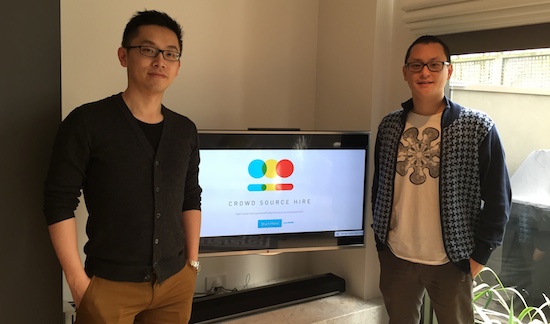CrowdSourceHire to verify tech talent for businesses

https://www.digitalnewsasia.com/sizzle-fizzle/crowdsourcehire-to-verify-tech-talent-for-businesses
- Australian-based Malaysian founders want to aid businesses in verifying tech talent
- Now part of Telstra’s muru-D accelerator, SEA expansion on the agenda
IF you are a non-technical founder of a business, it’s always stressful trying to recruit the right technical talent you need.
You’re obviously not the right person to evaluate whether the candidate in front of you is really as accomplished as he or she claims to be.
It was a problem faced many times by Desmond Hang and Ben Liau at their respective companies, and over time, the friends realised that they were – painfully – not the only ones.
Hang was previously cofounder and director for ILoveDiscounts.my which was sold to Dealmates in 2013, which was consequently acquired by iBuy. Liau comes from a background in digital marketing with stints at Meyer Cookware Australia and online retail children’s brands Tinyme.
According to Hang, obtaining candidates is not a problem, but hiring and identifying talented people is the issue.
“Even though I come from a technical background in software engineering, I still failed on my previous technical hires due to the wrong type of questions being asked during interviews, and a lack of assessment checks being performed,” he tells Digital News Asia (DNA) via email.
Both recognised the scale of this problem, with Hang sharing that 11% of new hires fail in the first 18 months due to technical incompetence.
“Even if you replace the candidate within six months, the process can cost you 2.5 times that person’s annual salary. So someone who earns US$100,000 a year could cost you a whopping US$250,000.
“It’s not uncommon. In a recent study, 36% of 1,400 executives cited poor skills match as the No 1 reason for failed hires, excluding performance issues,” he adds.
Aside from the massive financial drawback, bad hires can also result in legal issues, fewer sales, loss of worker productivity, and time wasted retraining; it can also have a negative impact on employee morale.
Fuelled by personal experience, with high market potential for the right solution, CrowdSourceHire was incorporated on March 2014 with Hang as chief executive officer and Liau as chief marketing officer.
The duo also roped in Rajnish Kumavat, an ex-colleague of Hang’s from online comparison service iSelect, as chief technology officer. He boasts extensive experience in talent verification, having managed offshore teams numbering in the hundreds.
The secret sauce
Headquartered in Australia, CrowdSourceHire is essentially an online marketplace that brings together industry experts with businesses that are looking to verify the skills of their potential hires
The company puts candidates through a three-stage pre-hire assessment process to ensure they have all the right skills for the job.
It crowdsources industry experts in the web development field, who write customised assessments based on a business’s specific job description. Potential candidates are thus assessed and given a recommendation on whether they have the right technical skills for the specific job.
The experts are put though a vigorous vetting process that consists of background checks and completing a thorough assessment. According to Hang, only about 20% of experts are allowed to join the programme.
Stage 1 involves a combination of multiple-choice and short-answer questions, which are designed to test candidates’ knowledge.
In Stage 2, they are tested on the application of their knowledge. They are given a virtual environment, and are asked to code the solution to a specific problem that they would encounter in the specific job they have applied for.
In Stage 3, the candidates do a video interview, and are required to answer a number of pre-recorded interview questions that evaluate their ability to communicate ideas effectively.
This test also helps to ensure that the individual taking the assessment is really the same person who took the previous two tests – something that existing online tests often fail to do, says Hang.
“Most recruitment agencies do not put their candidates through the proper testing procedures before presenting them to the business.
“We plan on supporting this industry and assisting recruitment agencies and businesses, with a recommendation on whether the candidate has the right skills for the job,” he adds.
In terms of pricing, CrowdSourceHire offers tiered packages: It costs US$149 for one candidate assessment and US$359 for up to five candidates, with pricing on request for larger numbers.

Lay of the land
CrowdSourceHire remains in beta and is focused on fulfilling the need for web development skills. To date, about 43 assessments have been complete with 58 industry experts vetted and evaluated.
The team is looking to extending the model into other technical industries in the future, including IT and engineering.
“And further down the track, we will be looking at expanding to other non-technical verticals as well,” says Hang.
Asked about what skills in particular are in high demand, he reports that startups are now mainly looking for PHP, HTML/ CSS front-end skills and more recently, skills in Ruby on Rails.
“Locally in Australia, there is quite a lot of talent but remuneration packages need to be commensurate with their level of expertise; otherwise retention of that talent is difficult.
“This is where startups find difficulty in locating resources, so either the technical talent needs to be a partner/ CTO (chief technology officer) or the startup is well-funded going into seed rounds,” he adds.
Hang says that in terms of local talent, generally the good candidates that are assessed have a passion for what they do, and that shows through their results in the assessment and pre-recorded interview.
“Communication skills for these developers are very important and consequently, our assessment framework encompasses this and gives weight to this qualification,” he adds.
When it comes to offshore talent, there are wide variations in the level of skills, and verification requests are typically for freelance projects and decisions are historically made by clients based upon review/ ratings on the freelance marketplaces, says Hang.
“They’ve been burnt several times before and consequently do not mind engaging us to verify the talent that they’re trying to hire for a freelance project,” he says.
Typically, a development project would cost about A$5,000 (US$4,392), so to spend US$200-300 on verification and having that peace of mind justifies the expenditure.
“They think of CrowdSourceHire as an ‘insurance policy’ in the verification of their talent,” he adds.
Currently, CrowdSourceHire has mainly startups as clients and intends to work its way up to small and medium businesses and recruitment agencies.
Accelerating past challenges
To aid in the rapid development and refinement of its platform, the team competed for and got a place in the ilab Germinate accelerator programme.
This programme was established by the Queensland Government in 2000 to support early stage high-tech companies through the first few years of development by building their business management capabilities, fostering mentor networks for founders, creating investor-ready companies, and graduating companies with increased chances of success.
There were quite a few challenges to overcome in creating the CrowdSourceHire platform, mainly in setting up a reliable non-biased assessment framework.
“We interviewed many hiring managers and also business mentors made available to us via the ilab programme that gave us invaluable feedback,” says Hang.
Another challenge was with regards to setting up a framework that could adequately identify the job scope versus job key performance index.
“Sometimes, business owners want so much from their hire that they’re setting up the role for failure from the on-set. In these instances, we get the expert to assist in navigating this tricky space so that business owners understand the scope of the role versus the talent versus the remuneration package provided,” he adds.
Most recently, the team competed for a spot in and was ultimately accepted into muru-D, a startup accelerator backed by Telstra.
“The whole experience was actually very eye-opening and the calibre of the competition was intense! We went from not having a chance during a round-robin pitch process and taking in all the constructive criticism, to becoming one of the stronger companies to get into muru-D.
“This will definitely help us a great deal in opening inroads into big corporates and assist in scaling our model quickly,” Hang says.
But as they say, there’s no place like home and despite the traction the team is getting in Australia, there remains one big thing left on the ‘to do’ list.
“Being from Malaysia, our preference would definitely be to roadmap our product to enter the South-East Asia region to solve that difficult problem of hiring the right technical hire,” says Hang.




Join The Discussion